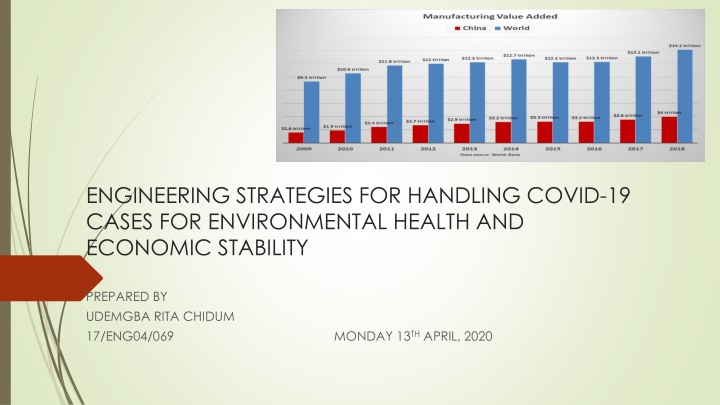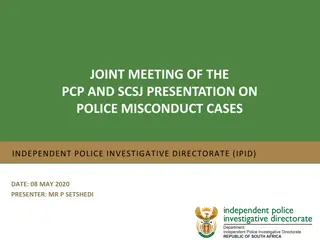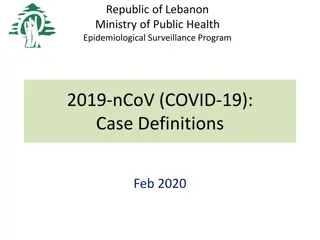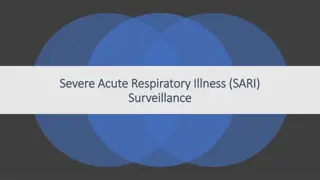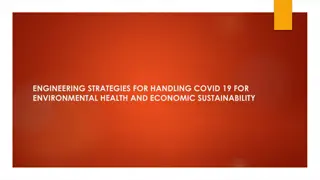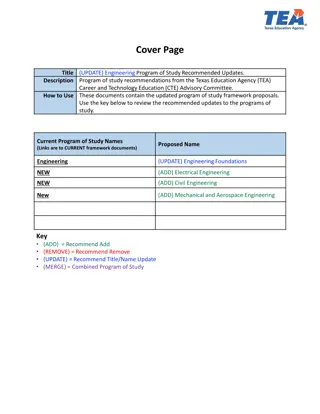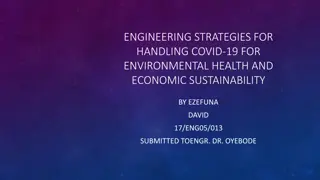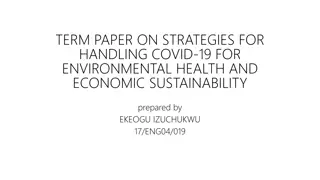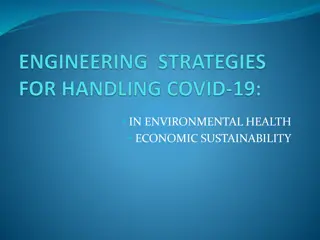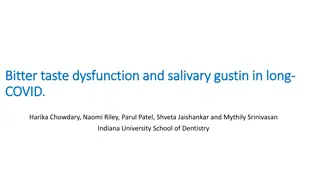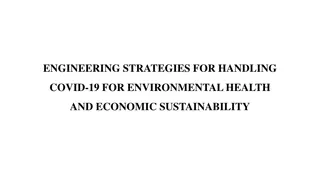ENGINEERING STRATEGIES FOR HANDLING COVID-19 CASES FOR ENVIRONMENTAL HEALTH AND ECONOMIC STABILITY
In light of the COVID-19 pandemic, this report outlines engineering strategies to manage cases effectively, focusing on environmental health and economic stability. It discusses innovative approaches to safeguard public health while addressing the economic repercussions. The document provides insights into crucial measures to combat the crisis and emphasizes the need for a coordinated response to ensure the well-being of communities.
Download Presentation

Please find below an Image/Link to download the presentation.
The content on the website is provided AS IS for your information and personal use only. It may not be sold, licensed, or shared on other websites without obtaining consent from the author.If you encounter any issues during the download, it is possible that the publisher has removed the file from their server.
You are allowed to download the files provided on this website for personal or commercial use, subject to the condition that they are used lawfully. All files are the property of their respective owners.
The content on the website is provided AS IS for your information and personal use only. It may not be sold, licensed, or shared on other websites without obtaining consent from the author.
E N D
Presentation Transcript
ENGINEERING STRATEGIES FOR HANDLING COVID-19 CASES FOR ENVIRONMENTAL HEALTH AND ECONOMIC STABILITY PREPARED BY UDEMGBA RITA CHIDUM 17/ENG04/069 MONDAY 13THAPRIL, 2020
TABLE OF CONTENTS INTRODUCTION How does economic development affect environmental health? How can we help? CONCLUSION
INTRODUCTION The concept of sustainable development as a new concept, process, and undeniable fact has emerged in the policies of major governments, and plays a key role in the development of human societies Sustainable development is, generally, a combination of the three social, economic, and environmental goals in which political goals are involved. In fact, sustainable development is the advancement of the quality of all aspects of life of today s generation without creating negative impacts on the lives of future generations. While it may seem easy to create sustainability in theory, the process of sustainable development faces many unforeseen problems and obstacles that slow down the process. One of the anticipated problems is the emergence of epidemic diseases that not only have a negative impact on the economy but also cause social problems, both of which are fundamental to sustainable development. . The COVID-19 (a new version of Coronavirus) is one of the newest and most serious challenges
The COVID-19 (a new version of Coronavirus) is one of the newest and most serious challenges facing governments, and there has not been much research into this problem. Although the understanding of COVID-19 is limited, interim guidance on laboratory biosafety was introduced by the World Health Organization (WHO). Kampf et al. investigated the persistence of coronaviruses on inanimate surfaces and ways to deal with it. They found that the period of persistence is nine days for coronaviruses, and some disinfectants, such as 62% 71% ethanol, 0.5% hydrogen peroxide, or 0.1% sodium hypochlorite can be very efficient in dealing with this virus. Lai et al. have evaluated the outbreak of COVID-19 and its challenges
How does economic development affect environmental health?
Economic development has led to tremendous improvements in peoples well-being, but often at the expense of the environment. Industrialization has contributed to pollution of air and water, changing dietary patterns, and shifting patterns of transportation and land use. Exposures to air and water pollutants directly increase disease. In Nigeria, efforts were already being made to bolster aggregate demand through increased government spending and tax cuts for businesses. The public budget increased from 8.83 trillion naira ($24.53 billion) in 2019 to 10.59 trillion naira ($29.42 billion) in 2020, representing 11 percent of the national GDP, while small businesses have been exempted from company income tax, and the tax rate for medium-sized businesses has been revised downwards from 30 to 20 percent. Unfortunately, the COVID-19 crisis is causing all components of aggregate demand, except for government purchases, to fall.
COVID-19 (Novel Coronavirus, Sars-Cov-2) pandemic is wreaking havoc and bringing the whole world into a standstill in an unprecedented fashion. The two major approaches were used in the current study, as follows: The possible correlations among the trends of confirmed cases in different case studies were investigated, and then a binary classification model was constructed to predict and classify using the group method of data handling (GMDH) algorithm based upon some critical factors; maximum, minimum, and average temperature, the density of a city, relative humidity, and wind speed were considered as the input dataset and the number of confirmed cases was selected as the output dataset for 30 days. Regression analysis was used, and a trend of the confirmed cases of COVID-19 analyzed in the five provinces with the highest confirmed cases, including Hubei, Guangdong, Henan, Zhejiang, and Hunan, and the daily fluctuations of confirmed cases were compared with fluctuations of weather parameters.
Africas largest innovation incubator, CcHub, will offer funding and engineering support to tech projects aimed at curbing COVID-19 and its social and economic impact. The Lagos and Nairobi based organization posted an application on its website this week, CcHub CEO Bosun Tijani told TechCrunch on a call. CcHub will provide $5,000 to $100,000 funding blocks to companies with COVID-19 related projects covering last-mile communication, support for the infected and the most vulnerable, production of essential medical supplies and support for disrupted food supply-chains. he organization, and its iHub affiliate, will also open up engineering support and resources from its CcHub Design Lab to funded companies, according to Tijani.
Pan-African on-demand trucking logistics company Kobo360 has asked employees who can work remotely to do so in Ghana and Nigeria, according to the Chief Strategy Officer Kagure Wamunyu. The Goldman Sachs backed startup is also planning contingencies to ensure supply-chain continuity, should COVID-19 disrupt business and mobility in its markets. In Kenya, the country is turning to its leading mobile-money product, M- Pesa, to reduce the the chances of an outbreak. Safaricom waived transaction fees on the app this week to increase digital-payments use and lower the risk of spreading the COVID-19 through physical handling of cash.
A List Of Fintech Firms Providing Free Technology During The Coronavirus Crisis This list has been changed from a chronological listing to a category-based listing with the following categories: 1) Accounting; 2) Chatbots/Virtual Assistants; 3) Collaboration; 4) Communications; 5) Cybersecurity; 6) Data analytics/management; 7) Digital banking; 8) Document management; 9) Earned wage access
; 10) Fundraising; 11) Human resources; 12) Identity management; ] 13) Insurance; 14) Lending; 15) Marketing; 16) Risk management; and 17) Wealth management.
Adjoint; https://adjoint.io Autobooks; autobooks.co Libeo; libeo.io Shtar; http://Shtar.com Xelix; https://bit.ly/39e2oL3 Right Indem; rightindem.com Symphony; https://goto.symphony.com/Business-Continuity-Planning.html Theta Lake; https://thetalake.com/free-compliant-collaboration-archiving/, etc
Conclusion The COVID-19 pandemic is a wake-up call to policymakers as unprecedented nature of the crisis has made it impossible for citizens to rely on foreign health care services and more difficult to solicit for international support demand for medical supplies and equipment. A more integrated response sectors including the trade sectors is required to address structural issues that make the country less resilient to. the unusual and given the competing spanning finance, several and health,
trade sectorsis required to address structural issues that make the country less resilient to shocks and limit its range of policy responses. In the long term, tougher decisions need to be made, including but not limited to diversifying the country s revenue base away from oil exports and improving investments in the health care sector in ensuring that the economy is able to recover quickly from difficult conditions in the future. a serious challenge of sustainable development was investigated using the GMDH algorithm and regression analysis. According to the results, the GMDH algorithm has an appropriate performance to predict and classify the parameters of a case study affected by COVID-19, and
the accuracies based on Wuhan datasets were equal to 95.7% and 85.7% for training and testing, respectively. No correlation was found among the different case study datasets in four countries, which might be due to different policies and types of restrictions in each country and means that the prediction of the trend could be made case by case.
